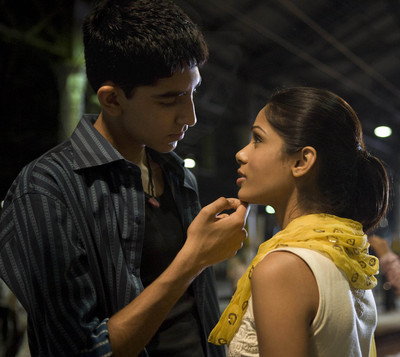‘Slumdog Millionaire’
Most fairy tales end with the obligatory "and they lived happily ever after."
But in India's Bollywood, they dance happily ever after.
And "Slumdog Millionaire" is nothing if not a Bollywood fairy tale -- complete with plucky hero, damsel in distress, powerful villain and daunting trials in which our hero must prove his mettle.
But never fear. This particular fairy tale, despite its Mumbai setting and occasional subtitles, positively brims with accessible elements -- beginning with the title character, a resourceful orphan who winds up in the hot seat on India's version of "Who Wants to Be a Millionaire."
Potentially treacly material, to be sure. Yet, in the hands of director Danny Boyle, "Slumdog" soars on the strength of its beguiling characters and exotic setting.
Since his mid-'90s big-screen debut, the ever-eclectic Boyle has proved his mastery of multiple genres, from neo-noir thriller ("Shallow Grave") to zombie horror ("28 Days Later").
My favorite Boyle movies? The delightful, family-friendly fantasy "Millions" and that decidedly un-family-friendly blast of irreverence, "Trainspotting."
Elements from both movies surface in "Slumdog Millionaire," which explores, among other things, childhood resilience in the face of tragedy -- and how an unquenchable belief in a happily-ever-after ending can help it come true.
Assuming, of course, that you're not allergic to happy endings in the first place.
Don't let the gritty slum setting and sometimes harrowing circumstances fool you.
Based on Vikas Swarup's novel "Q&A" and adapted by Simon Beaufoy ("Miss Pettigrew Lives for a Day"), "Slumdog Millionaire" follows the amazing adventures of young Jamal Malik (Dev Patel of the British TV series "Skins").
A humble orphan son of the Mumbai slums who works as a cell phone call center gofer, Jamal's an unlikely contestant -- and an even unlikelier winner -- on the Hindi version of "Who Wants to Be a Millionaire."
So unlikely that the show's oh-so-suave, oh-so-smarmy host (Anil Kapoor) is convinced Jamal must be cheating. After all, how could a lowly, uneducated slumdog know all those answers?
As the police interrogate him (to the accompaniment of beatings and electrical shocks), Jamal explains precisely how he knows all those answers: by flashing back through his star-crossed life as a street urchin challenged by desperate poverty.
To say nothing of the machinations of his brother Salim, who doesn't always have Jamal's best interests at heart. Unless, of course, it's a matter of life and death -- which, considering their desperate life, turns out to be the case more often than not.
Yet despite Jamal's daunting existence, one shining inspiration spurs him onward: his quest to find Latika (Freida Pinto), the little girl who rounded out their version of the "Three Musketeers" before disappearing into squalor -- and worse.
Jamal has never stopped looking for Latika. And if he becomes a contestant on "Millionaire," India's most popular TV show, she might see him -- and that might lead to the reunion he's dreamed of all his young life.
We never see how Jamal becomes a "Millionaire" contestant. (Those of us who have endured the U.S. audition process wish it were as easy as it seems to be for Jamal.) But that's exactly as it should be in a fairy tale; things happen because they are destined to happen.
Call it karma.
But even with karma operating at full power, it's Boyle -- operating at full, kinetic power -- who invests this melodramatic tale with irresistible energy and heart.
Working with Indian co-director Loveleen Tandan, Boyle explores India's exotic extremes with such visual vitality that the colors and images swirl across, then dance off, the screen.
And, unlike some movies that tell their stories through flashbacks and jump cuts, "Slumdog Millionaire's'' nonlinear structure doesn't give you a headache or force you to make a mental scorecard just so you can keep up with the action. We may not understand every reference the first time we see it, but we understand every emotion.
Which is exactly how it should be in a movie that earns its happy ending. By the time the cast members assemble at Mumbai's historic Chhatrapati Shivaji (formerly Victoria) Terminus for "Slumdog Millionaire's" all-dancing finale, you may be tempted to join in.
Contact movie critic Carol Cling at ccling@reviewjournal.com or 702-383-0272.
Review "Slumdog Millionaire" 120 minutes R; violence, disturbing images, profanity Grade: B+ at multiple locations Carol Cling's Weekly Movie Minute Deja View Around the world, tales of children on their own have inspired unforgettable cinematic memories in these classic titles: "The Kid" (1921) -- As the opening title reads, "A comedy with a smile -- and perhaps a tear," as the Little Tramp (Charlie Chaplin, who also wrote and directed this, his first feature) takes in an abandoned child (Jackie Coogan). "Shoe Shine" (1946) -- Vittorio De Sica's neo-realist classic, set in post-World War II Italy, focuses on two shoeshine boys who realize a dream that's shattered when they're sent to a reformatory. "Oliver Twist" (1948) -- Director David Lean brings Charles Dickens' novel to life as the orphaned title character (John Howard Davies) runs away from a workhouse and falls in with Fagin (Alec Guinness) and his stable of pickpockets. "Pixote" (1981) -- Subtitled "The Law of the Weakest," Brazilian director Hector Babenco's haunting account of a 10-year-old runaway (Fernando Ramos da Silva) on the streets of Sao Paolo. "Salaam Bombay!" (1988) -- Director Mira Nair ("Monsoon Wedding") makes an auspicious feature debut with this portrait of resilient street children. -- By CAROL CLING


















